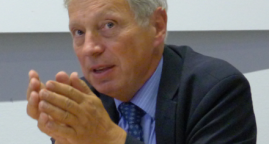2017 Global Platform for Disaster Risk Reduction
The Fifth Global Platform on Disaster Risk Reduction was held in Cancún from May 22-26, one year after the World Humanitarian Summit (Istanbul, 23-24 May 2016), two years after Sendai in March 2015, more than five thousand people came from 180 countries in Mexico to take stock of the implementation of the Sendai Framework for Disaster Risk Reduction, a non-binding document that recognizes the essential role of Governments in Their own countries) and discuss the best ways to prevent and cope with natural disasters by committing to concrete actions :
- technical means of early warning, preparation and organization of relief;
- human resources, Governments, international organizations, parliamentarians, civil society (private economy – insurance and investors – scientists, academics, media, humanitarian and charitable organizations), affected communities, Women and persons with disabilities;
- modern means, some expensive as satellites, others widespread and cheap as mobile phones.
All had come to Cancún at the invitation of the Government of Mexico and UNISDR (United Nations Office for Disaster Risk Reduction), based at the Palais des Nations in Geneva, to exchange best practices, feedback , Strengthen regional and international networks: it is no longer possible to act alone: Governments must ensure good cooperation between their various Ministries, and also with other Governments, as well as with the organizations of the United Nations system The Red Cross and Red Crescent Movement (ICRC, National Societies, International Federation), NGOs, local communities, the private sector, and ensure that the affected populations are informed, consulted , Associated with prevention, preparedness and action.
Respect for the rights of affected populations, as well as relief organizations, must also make this plan of action: human rights and, where appropriate, the rights of refugees, migrants, protection of property Cultural and environmental issues and, in the event of armed conflict in addition to a natural disaster, international humanitarian law.
Training – technical and legal – is also part of this effort and must contribute to effective prevention that takes into account feedback and local conditions.
The role of religious organizations, close to the field and enjoying the confidence of local populations, before, during and after the crises, will be taken up by the Holy See, the Order of Malta and other organizations such as Caritas.
One could summarize these exchanges in Cancun
- the reaction from urgency to action over time;
- international assistance to build local resilience capacity;
- from tunnel vision (or silo) to an overall perspective of approaches and actors.
This diversity of approaches and skills and a willingness to share is the value of these gatherings as climate and demographic changes and political uncertainties make these disasters all the more dangerous. The sharing of experiences and skills in the service of local and international solidarity is a vital necessity for the humanity of today and tomorrow.
After Sendai in 2015, Cancún in 2017, the next appointment was set for 2019 in Geneva.
Find out more : official statements
Michel Veuthey Deputy Permanent Observer of the Order of Malta at the U.N. in Geneva
Geneva
Related Articles
The long road to a Global Compact on Refugees
The long road to a Global Compact on Refugees
Order of Malta | Migrants and refugees | Meeting in Rome
Order of Malta | Migrants and refugees | Meeting in Rome
Migration, Refugees, Humanitarian and Peace
Migration, Refugees, Humanitarian and Peace



